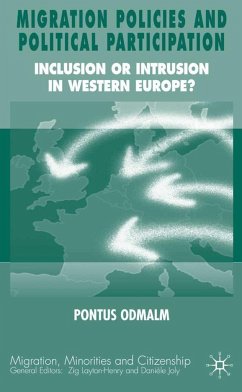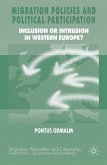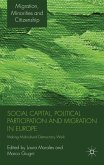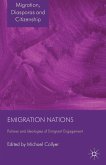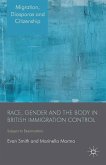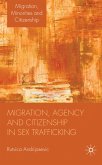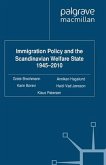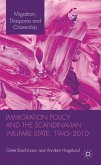- Gebundenes Buch
- Merkliste
- Auf die Merkliste
- Bewerten Bewerten
- Teilen
- Produkt teilen
- Produkterinnerung
- Produkterinnerung
Comparing differences in migrant political participation, the author discusses the influence that institutions have on opportunities and constraints for migrants' political engagement. The book adopts a multi-country comparative approach, highlighting three areas where institutions influence the scope for migrant actors in Sweden, the Netherlands, France, Germany and the UK: - Strategies adopted by organized migrant interests in response to specific political structures - The role of identity and its relevance in explaining varying political participation - Institutional effects on the relationship between migrant organizations and political parties…mehr
Andere Kunden interessierten sich auch für
![Migration Policies and Political Participation Migration Policies and Political Participation]() P. OdmalmMigration Policies and Political Participation89,99 €
P. OdmalmMigration Policies and Political Participation89,99 €![Social Capital, Political Participation and Migration in Europe Social Capital, Political Participation and Migration in Europe]() Social Capital, Political Participation and Migration in Europe81,99 €
Social Capital, Political Participation and Migration in Europe81,99 €![Emigration Nations Emigration Nations]() Emigration Nations41,99 €
Emigration Nations41,99 €![Race, Gender and the Body in British Immigration Control Race, Gender and the Body in British Immigration Control]() E. SmithRace, Gender and the Body in British Immigration Control45,99 €
E. SmithRace, Gender and the Body in British Immigration Control45,99 €![Migration, Agency and Citizenship in Sex Trafficking Migration, Agency and Citizenship in Sex Trafficking]() Rutvica AndrijasevicMigration, Agency and Citizenship in Sex Trafficking41,99 €
Rutvica AndrijasevicMigration, Agency and Citizenship in Sex Trafficking41,99 €![Immigration Policy and the Scandinavian Welfare State 1945-2010 Immigration Policy and the Scandinavian Welfare State 1945-2010]() Grete BrochmannImmigration Policy and the Scandinavian Welfare State 1945-201041,99 €
Grete BrochmannImmigration Policy and the Scandinavian Welfare State 1945-201041,99 €![Immigration Policy and the Scandinavian Welfare State 1945-2010 Immigration Policy and the Scandinavian Welfare State 1945-2010]() Grete BrochmannImmigration Policy and the Scandinavian Welfare State 1945-201041,99 €
Grete BrochmannImmigration Policy and the Scandinavian Welfare State 1945-201041,99 €-
-
-
Comparing differences in migrant political participation, the author discusses the influence that institutions have on opportunities and constraints for migrants' political engagement. The book adopts a multi-country comparative approach, highlighting three areas where institutions influence the scope for migrant actors in Sweden, the Netherlands, France, Germany and the UK: - Strategies adopted by organized migrant interests in response to specific political structures - The role of identity and its relevance in explaining varying political participation - Institutional effects on the relationship between migrant organizations and political parties
Produktdetails
- Produktdetails
- Migration, Diasporas and Citizenship
- Verlag: Macmillan Education / Palgrave Macmillan UK / Springer Palgrave Macmillan
- Artikelnr. des Verlages: 978-1-4039-9268-0
- 2005
- Seitenzahl: 258
- Erscheinungstermin: 26. Oktober 2005
- Englisch
- Abmessung: 223mm x 183mm x 21mm
- Gewicht: 461g
- ISBN-13: 9781403992680
- ISBN-10: 1403992681
- Artikelnr.: 21442677
- Herstellerkennzeichnung
- Libri GmbH
- Europaallee 1
- 36244 Bad Hersfeld
- gpsr@libri.de
- Migration, Diasporas and Citizenship
- Verlag: Macmillan Education / Palgrave Macmillan UK / Springer Palgrave Macmillan
- Artikelnr. des Verlages: 978-1-4039-9268-0
- 2005
- Seitenzahl: 258
- Erscheinungstermin: 26. Oktober 2005
- Englisch
- Abmessung: 223mm x 183mm x 21mm
- Gewicht: 461g
- ISBN-13: 9781403992680
- ISBN-10: 1403992681
- Artikelnr.: 21442677
- Herstellerkennzeichnung
- Libri GmbH
- Europaallee 1
- 36244 Bad Hersfeld
- gpsr@libri.de
PONTUS ODMALM is Associate Faculty at the Sussex European Institute, University of Sussex, UK.
Acknowledgements PART 1: INTRODUCTION Introduction Outline of Book Chapters Data Retrieval Statistical Material Questionnaire Interviews Conclusion PART 2: HISTORICAL OVERVIEW: PATTERNS OF IMMIGRATION, IMMIGRATION AND CITIZENSHIP POLICIES Introduction France Composition of Immigrant Population Immigration Policy and Status of Migrants Citizenship Policy Germany Composition of Immigrant Population Immigration Policy and Status of Migrants Citizenship Policy The Netherlands Composition of Immigrant Population Immigration Policy and Status of Migrants Citizenship Policy Rotterdam Sweden Composition of Immigrant Population Immigration Policy and Status of Migrants Citizenship Policy Malmö Britain Composition of Immigrant Population Immigration Policy and Status of Migrants Citizenship Policy PART 3: THE ROLE OF INSTITUTIONS IN SHAPING THE OPPORTUNITIES AND CONSTRAINTS OF ACTOR'S BEHAVIOUR Introduction The Emergence of Neo-Institutionalism Defining Institutions How and Why Institutions are Important Governing Institutions Political Institutions in France Political Institutions in Germany Political Institutions in the Netherlands Political Institutions in Sweden Political Institutions in Britain Political Institutions as Constraints and Facilitators Outcomes of Institutions: Political Opportunity Structures Formal Institutional Structures National Cleavage Structures Informal Procedures Alliance Procedures Conclusion PART 4: IDENTITY, CITIZENSHIP AND IDENTIFICATION Introduction Identity - Relevance and Construction Interpretations and Political Participation Identification as an Explanatory Variable The Study Groups - Sweden and the Netherlands Identification Levels - Malmö and Rotterdam Satisfaction with Performance of Local Politicians Likelihood of Participating Intensity of Participation Interest in Swedish/Dutch Politics versus Country of Origin Conclusion PART 5: CIVIL SOCIETY, MIGRANT ORGANISATIONS AND POLITICAL PARTIES Introduction Civil Society Structure andOrganisation Migrant Organisations in France, Germany, the Netherlands, Sweden and Britain Migrant Organisations in Malmö and Rotterdam The Relationship Between Migrant Organisations and Political Parties in Malmö and Rotterdam Conclusion PART 6: SUMMARY AND CONCLUSIONS Introduction Explaining Political Participation amongst Migrants Strategies Adopted by Migrants as a Response to the Institutional Environment Institutional Influences on Identification Institutional Effects on the Relationship Between Organisations and Political Parties Bibliography Appendix 1
Acknowledgements PART 1: INTRODUCTION Introduction Outline of Book Chapters Data Retrieval Statistical Material Questionnaire Interviews Conclusion PART 2: HISTORICAL OVERVIEW: PATTERNS OF IMMIGRATION, IMMIGRATION AND CITIZENSHIP POLICIES Introduction France Composition of Immigrant Population Immigration Policy and Status of Migrants Citizenship Policy Germany Composition of Immigrant Population Immigration Policy and Status of Migrants Citizenship Policy The Netherlands Composition of Immigrant Population Immigration Policy and Status of Migrants Citizenship Policy Rotterdam Sweden Composition of Immigrant Population Immigration Policy and Status of Migrants Citizenship Policy Malmö Britain Composition of Immigrant Population Immigration Policy and Status of Migrants Citizenship Policy PART 3: THE ROLE OF INSTITUTIONS IN SHAPING THE OPPORTUNITIES AND CONSTRAINTS OF ACTOR'S BEHAVIOUR Introduction The Emergence of Neo-Institutionalism Defining Institutions How and Why Institutions are Important Governing Institutions Political Institutions in France Political Institutions in Germany Political Institutions in the Netherlands Political Institutions in Sweden Political Institutions in Britain Political Institutions as Constraints and Facilitators Outcomes of Institutions: Political Opportunity Structures Formal Institutional Structures National Cleavage Structures Informal Procedures Alliance Procedures Conclusion PART 4: IDENTITY, CITIZENSHIP AND IDENTIFICATION Introduction Identity - Relevance and Construction Interpretations and Political Participation Identification as an Explanatory Variable The Study Groups - Sweden and the Netherlands Identification Levels - Malmö and Rotterdam Satisfaction with Performance of Local Politicians Likelihood of Participating Intensity of Participation Interest in Swedish/Dutch Politics versus Country of Origin Conclusion PART 5: CIVIL SOCIETY, MIGRANT ORGANISATIONS AND POLITICAL PARTIES Introduction Civil Society Structure andOrganisation Migrant Organisations in France, Germany, the Netherlands, Sweden and Britain Migrant Organisations in Malmö and Rotterdam The Relationship Between Migrant Organisations and Political Parties in Malmö and Rotterdam Conclusion PART 6: SUMMARY AND CONCLUSIONS Introduction Explaining Political Participation amongst Migrants Strategies Adopted by Migrants as a Response to the Institutional Environment Institutional Influences on Identification Institutional Effects on the Relationship Between Organisations and Political Parties Bibliography Appendix 1

